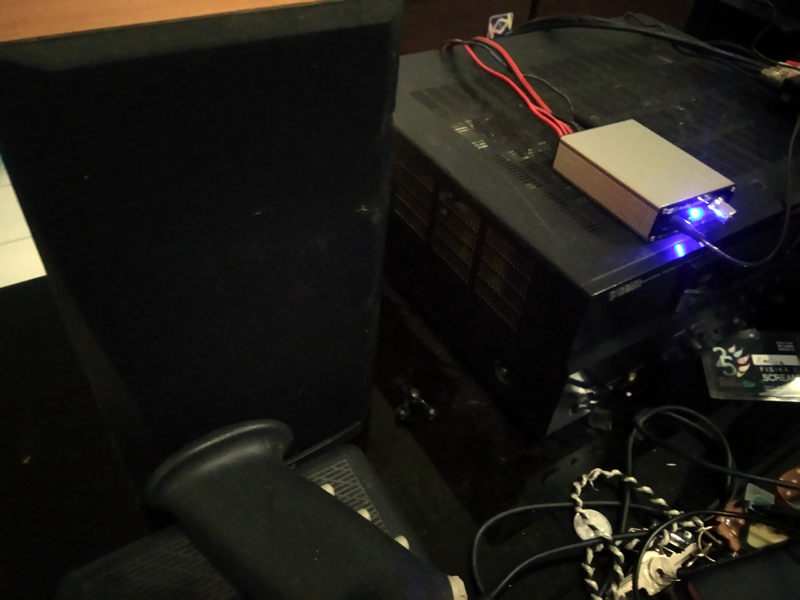kolderman wrote on 2021-06-19, 00:00:
I use a powered mixer as a kind of preamp feeding powered stereo speakers. The inputs are a headphone dac for most of my pcs which have spdif out, and regular line out for the rest, and my midi stack. Don't know if I would ever bother trying to power passive speakers with a powered mixer...what's the point here? Ghe sound from old games is not high fidelity enough to need hifi quality speakers.
Excuse any confusion, but certain references I read implied that powering passive speakers is one of the primary purposes of a powered mixer.
I guess I see where you're coming from, but your mindset that modest bookshelf speakers are over-the-top for PC usage doesn't fit how I see things. For one thing, plenty of old games use redbook audio, and for another, computers have a lot more uses than just games, so in my view limiting oneself to poor quality plastic toy speakers with very limited range and no volume headroom is a choice I'd never make personally. But I can see how certain use cases and people would be entirely satisfied with it. Viva la difference!
My philosophy is the same philosophy which drives any effort of preservation or to keep quality hardware out of landfill by taking extra effort, and in doing so create for oneself quality setups and capabilities that many others pay good money for.
Pierre32 wrote on 2021-06-19, 00:25:
kolderman wrote on 2021-06-19, 00:00:Don't know if I would ever bother trying to powe passive speakers with a powered mixer...what's the point here?
Making use of passive speakers that are lying around!
I've got a lovely pair of Compaq branded passive speakers. They do ok hanging off an SB16 that has an internal amp, but they're basically limited to that scenario. So I've gone down the Shreddoc line of thinking often. Personally I'd probably go with a line mixer + standalone amp. Either way the challenge is the same: How to make use of perfectly good passive speakers, with gear that suits the desk.
Concisely well put (a skill I don't have, 🤣).
Speakers are one of those things you see a lot of when thrifting. Even in my little old town, over the past year I've seen a handful of well branded, wooden-construction, Made In Japan, magnetically-shielded ~15-25W bookshelf speakers. In my niche view, these things are absolute gold, you couldn't suit the range and volume requirements of PC world better.
The problem (such as it is - moderately first worldy) is a common one, I suppose : the market is saturated with all-in-one New Plastic, leaving only tiny niches for enthusiast component products.
Upon reflection you're probably right in your approach to keep the amp + mixer separate. Not least because, at least we have some easy available market options with regards passive mixers. And there are a lot of small amps/modules out there, just a matter of finding the rare gold that isn't cheap corner-cutting crap or expensive boutique pay-us-200%-for-our-fancy-design. Just good, competent, technically sound gear at a fair and appropriately-modest-for-the-context price.
Jo22 wrote on 2021-06-19, 04:11:Hi, please keep in mind that vintage amplifiers often used true sine ratings,
which didn't take music into account,
but were re […]
Show full quote
Hi, please keep in mind that vintage amplifiers often used true sine ratings,
which didn't take music into account,
but were real values, at least, while in todays world, they use PMPO.
And PMPO is the one with the ridiculous high numbers, sadly. To increase sales, I guess.
So in some case, a 500w amp of today can't cope with a 20w amp from the 70s/80s.
In an ideal world, other ratings would be used.
RMS is not ideal, either, but at least uses a scientific model (based on pink noise).
Absolutely. Similar principles exist in the world of guitar amps which I used to play with. You stick a 5 watt valve amp next to your grandma and turn the volume up to full and she's not going to be making you a nice dinner that day. 😉
Supporter of PicoGUS, PicoMEM, mt32-pi, WavetablePi, Throttle Blaster, Voltage Blaster, GBS-Control, GP2040-CE, RetroNAS.
